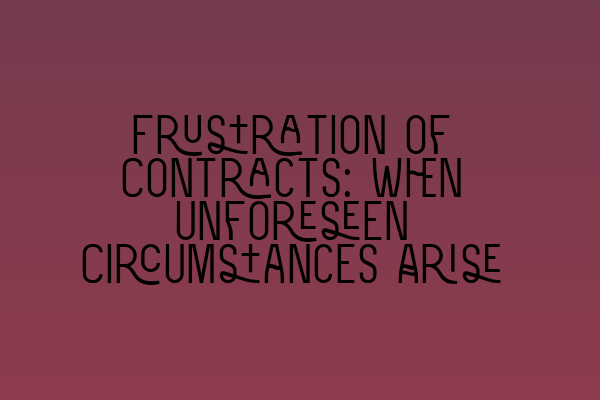Frustration of Contracts: When Unforeseen Circumstances Arise
Contracts are the backbone of business transactions and legal agreements. They provide the framework for parties to negotiate and establish their rights and obligations. However, there are times when unforeseen circumstances arise that make it impossible for the parties to fulfill their obligations. In such situations, frustration of contracts may come into play.
But what exactly is frustration of contracts? How does it affect the parties involved? And what legal remedies are available? In this article, we will explore the concept of frustration of contracts and its implications in contract law.
Understanding Frustration of Contracts
Under contract law, frustration occurs when an unforeseen event or circumstance arises after the formation of a contract, which makes it impossible for the parties to perform their contractual obligations. This event or circumstance is typically beyond the control of the parties and cannot be attributed to any fault or negligence on their part.
Frustration can arise in various forms, such as natural disasters, government regulations, the death or incapacity of a key party, or the destruction of the subject matter of the contract. In such cases, the purpose of the contract becomes impossible to achieve, and it would be unjust to hold the parties accountable for non-performance.
Implications of Frustration
When frustration occurs, the general rule is that the contract becomes void and the parties are discharged from their obligations. This means that neither party can sue for damages or seek specific performance. The parties are simply released from the contract and are no longer bound by its terms.
However, it’s important to note that frustration does not automatically discharge the contract. The doctrine of frustration is narrow, and the courts apply strict criteria to determine whether a contract has been frustrated. The event or circumstance must be unforeseen, beyond the control of the parties, and significantly different from what was contemplated by the parties when they entered into the contract.
In some cases, the parties may have anticipated the possibility of the frustrating event and included specific provisions in the contract to address such situations. These provisions, known as force majeure clauses, allocate the risk and responsibility in the event of specified unforeseen circumstances. It’s important to carefully review the contract to determine if a force majeure clause exists and its applicability to the current situation.
Legal Remedies
If frustration of a contract occurs, the parties may pursue alternative legal remedies to resolve the situation. One possible remedy is the restitution of any benefits conferred before the frustrating event. This means that each party is entitled to claim the value of any performance or payment made under the contract until the point of frustration.
Another remedy is the application of the principle of quantum meruit, which allows a party to recover a reasonable sum for work done or services rendered. This remedy ensures that parties are not left uncompensated for their efforts prior to the frustration.
It’s important to seek legal advice if you believe that your contract has been frustrated. A qualified solicitor who specializes in contract law can assess your situation, analyze the terms of the contract, and help you determine the best course of action.
Conclusion
Frustration of contracts is a legal concept that provides relief to parties when unforeseen circumstances make it impossible for them to perform their contractual obligations. Understanding the implications of frustration and the available legal remedies is essential for navigating contract law and protecting your rights.
If you found this article helpful, you may be interested in reading the following related articles:
- Exploring the Impact of Frustration on Contractual Obligations: Legal Insights
- Interpreting Contractual Clauses: Unlocking the Hidden Meanings
- Legal Aspects of Business Contracts: Key Considerations for Entrepreneurs
- SQE Contract Law vs. Traditional Qualifications: A Comparative Analysis
- Agreements in Contract Law: Understanding Its Various Types
